Covid: Small towns 'set to benefit from pandemic recovery'
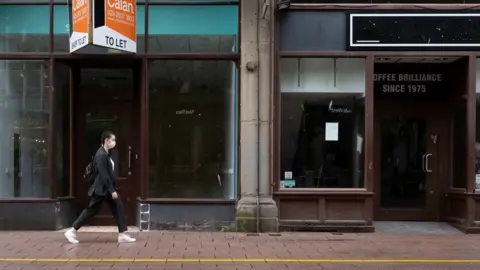 Getty Images
Getty ImagesSmall towns are set to benefit from a post-pandemic recovery as more people work from home and support independent businesses, a retail expert has said.
Prof Cathy Parker said larger cities in Wales such as Cardiff and Swansea could also recover well with the right planning and resources.
But she warned middle-sized towns could face the biggest challenges.
The Welsh government has a target of 30% of people working "at or near home" after the pandemic is over.
That could mean working at home or a co-working office where space is rented by the day or month.
That may change depending on the outcome of the Senedd election on 6 May.
Many people are expected to adopt "hybrid" working after the pandemic is over - working some days at home, others in the office.
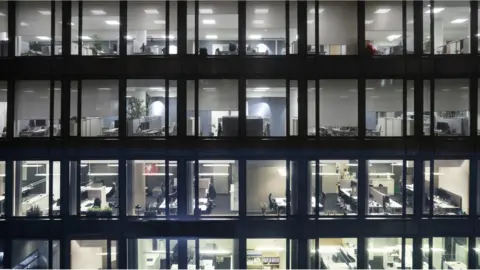 Getty Images
Getty ImagesBut more people working from home raises questions, including whether people can easily adapt their homes for work, the standard of broadband across Wales and the potential impact on shops and cafes.
On the other hand, fewer people travelling to and from work could help tackle congestion and benefit the environment.
A recent report by the Senedd's economy committee warned the effects of remote working would need to be monitored to ensure they did not increase inequality by "favouring more highly-skilled and affluent workers".
It also called for a retail strategy to address the challenges faced by businesses and workers in light of more remote working.
'Resilient and sustainable'

Prof Parker, of Manchester Metropolitan University, said it was not an argument about towns versus cities, but rather about each place having an individual recovery plan based on data which showed what worked best for them.
"Small places, if they are serving the needs of the small catchment that's around them, can be very resilient and very sustainable," she explained.
"It's not all about growing, it's about serving the people that live around your town so small places have got it a little bit easier."
She pointed to places such as Porthcawl in Bridgend county which had seen a 20% drop in footfall last year compared with much larger drops in other places, because it was serving a local community.
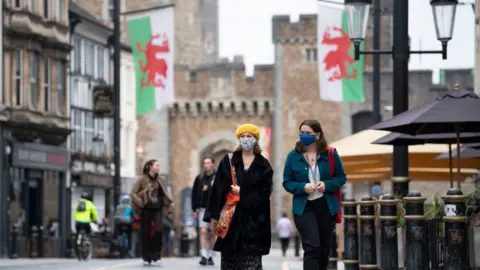 Getty Images
Getty ImagesCities have traditionally relied on lots of workers coming into the centre and spending money in businesses there, Prof Parker said.
"The larger places will have more adjusting to do but they've probably got the resources to do it.
"It's probably perhaps some of those medium-sized places that might struggle more because they are affected by the changes in commuting patterns, and perhaps they haven't got the partnerships there to sort of manage that over the next few years."
More people are setting up small businesses and large companies are looking for smaller offices, or deciding what to do with surplus space once workers return for only part of the week.
More flexibility
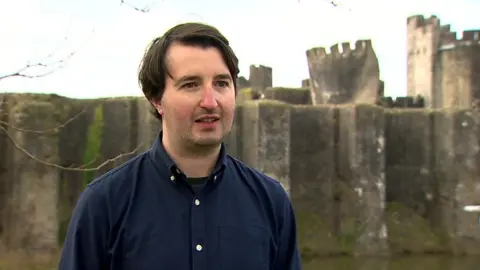
Work will be more about "flexibility" after the pandemic, according to Gareth Jones, chief executive of the co-working offices business Town Square Spaces.
"Now we've all had this experiment [of] working from home, we realised working from home is great a couple of days a week, but it's not always ideal, especially if you've got cats jumping on your Zoom and things like this," he said.
"We're finding a lot of demand is not people wanting to come in five days a week, it's one or two days here and there.
"And the demand from the corporate side is interesting because there are companies saying: 'We've got more space than we need, how can we use this in a different way'?"
'Lots of positives'
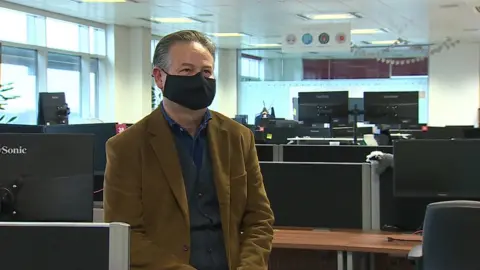
Credit reference company Creditsafe manages offices in 14 countries from its Cardiff headquarters.
Staff have been largely working from home and have told bosses they want a 50:50 split between working at home and the office after the pandemic.
"A lot of people were spending an hour each way to work. So, you know, their lives changed. There are lots of positive to this as well," said chief executive Cato Syversen.
The planned expansion of the company's Cardiff offices will not now go ahead.
'I can't wait'
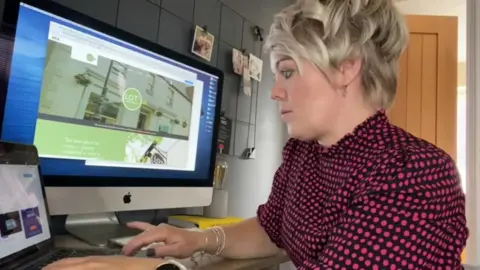
Emma Jones, a graphic designer from Wrexham, gave up her full-time job to set up her own business in February 2020 - just before the pandemic hit.
She is looking forward to going back to a co-working hub in the town in order to be surrounded by a support network.
"I can't wait to get out the house," she said, adding it was important for workers to return to towns like Wrexham to "help the economy" and "help each other sort of get back into the swing of things".

- I WAS THERE WHEN S4C BEGAN: Mai Davies reunites those who remember the night S4C began
- 100 YEARS OF TOMMY COOPER: Mike Bubbins celebrates the life and work of the Welsh legend

